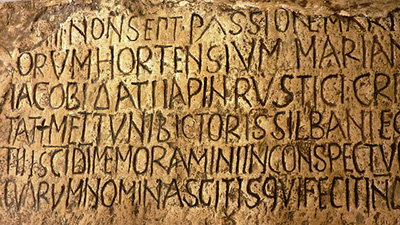|
I Should Have Learned Latin

Permission is granted to reprint the following article as long as no changes are made and
the byline, copyright information,and the resource box is included. Please let me know if you use this article by sending an email to dje@newedisongazette.com.
I Should Have Learned Latin
Copyright © November 29, 2015 Douglas W Jerving.
All Rights Reserved.
It used to be a requirement for anyone going on to college level studies that he study
Latin. Then in America, because of our cultural predispositions against Catholicism, we
distanced ourselves from this tendency toward European linguistics. The fundamentalist
fear of anything that smacked of Catholic indoctrination pushed the American study of
the English language away from an understanding of its origins, which was basically Latin.
Despite the fundamentalist rejection of the study of Latin because of its religious
associations with Catholicism, the Latin language cannot be disregarded. It should not be
treated as just another dead language useful only to scholars of ancient or mediaeval
times. It is still a language worth studying. And I finally understand why.
Latin is the basis for many modern European languages, including French, Spanish,
Portuguese, and Italian. I have studied German, French, Hebrew and Koine (ancient) Greek,
and I am currently learning Spanish.
I have noticed that even old Greek is often very similar to Latin; even though I have
never studied Latin I find that Latin and Greek have many cognative (similar of origin)
words. Ancient Greek incorporates a lot of ancient Semitic terms, including Hebrew and
it's cognates; so there is also a backwards correlation as well among all these languages
that make up our modern English language.
Modern Greek is even more Latinized since it is more European; it is therefore more similar
to modern European linguistics than ancient Greek, and easier to learn for the native
Anglican speaker.
If you know Latin, you are immediately at ease with many European languages, and can
probably get the gist of them without to much of a struggle. Having learned Latin, you
will automatically have an affinity for all the Latin based languages. You will already
have a fairly good understanding of their basic meaning.
As an aside, one of the reasons why Latin continued so long as the language of the
Catholic Church in Europe was because it was so closely aligned to the cognates related
to it during the medieval times. Whether your common language was French or Spanish or
even Greek, you still understood the basic concepts because your language was similar to
the Latin of the Church.
This is contrary to the modern fundamentalist view that Latin was used to conceal the Word
of God from the common man. Instead, Latin’s continued use in the Catholic Church was
likely because it was the underlying language base of the parishioners. In other words,
it was the near lingua franca for all Europeans at that time. It was a language similar
to those of the commoner, whatever modern language he spoke, and if he really wanted to
understand what God was saying to him it would not be so hard to grasp since it was
already familiar.
English is an Indo-European language very different from Latin, but because modern English
has absorbed a great deal of Latin based cognates, it is still not terribly difficult to
learn the Latin based languages. The more you learn one Latin language the easier it is to
understand the rest.
I also studied German in high school. It is totally different from all of the Latin based
languages from my recollection and I'm not sure where to place it. Nor are many linguists
sure about whether German is or is not Indo-European. At many points it does seem that
German and English are closer to one another than, say, English and French.
It seems to me that it is nearly impossible to synthesize my very limited understandings
of the Latin based languages with the Germanic. Maybe that is why the Reformation in Germany
started as a Protest movement first. Even so, the religious and educated hierarchy amongst
the Germanic tribes still used Latin like the rest of Europe. (The first real Protestants
were German: the Lutherans. The rest of the European movements against Catholicism were
Reformed. Now we consider anyone not of the Catholic faith to be protestant. But there was
a time when there was a difference.)
Despite the difference between late medieval German, English and other European
nation-states, and their religious or political distinctives, they all have the one
constant – a commonality of a basic understanding of the ancient Latin left to them from
Rome’s occupation. And because of Roman linguistic influence upon Europe, to a lesser
degree, we also have an affinity to the linguistic influences upon Rome: Greek, Hebrew,
and the Semitic languages that were concurrent.
The Latin language absorbed or instilled upon all of that and passed it on to us. To learn
Latin is to begin learning nearly all modern European languages, even to a small extent the
Scandinavian ones that are very different, but are at least influenced by the rest. Their
language patterns have been heavily influenced by their conversion to Christianity after
their incursions into England and France. Latin is literally the middle ground between all
European-based languages. It is a good place to start for anyone seriously interested in
European language studies, or even ancient Greek and Semitic.
Perhaps…
I should have learned Latin.
------------------------
Doug Jerving is the publisher of the NewEdisonGazette.com. You may contact him at
dje@newedisongazette.com.
=================================

Return to The New Edison Gazette main site.
|
|